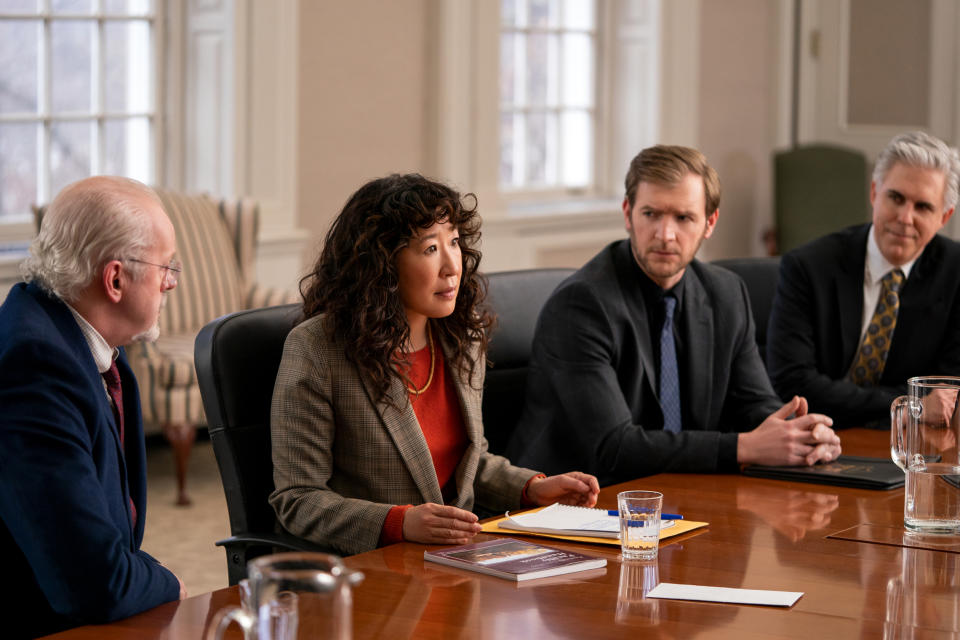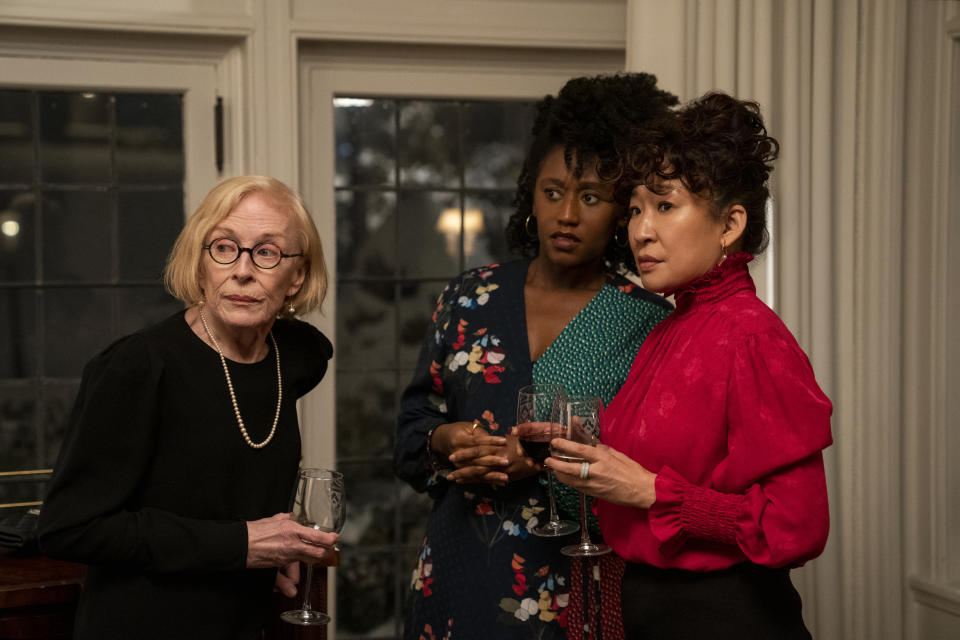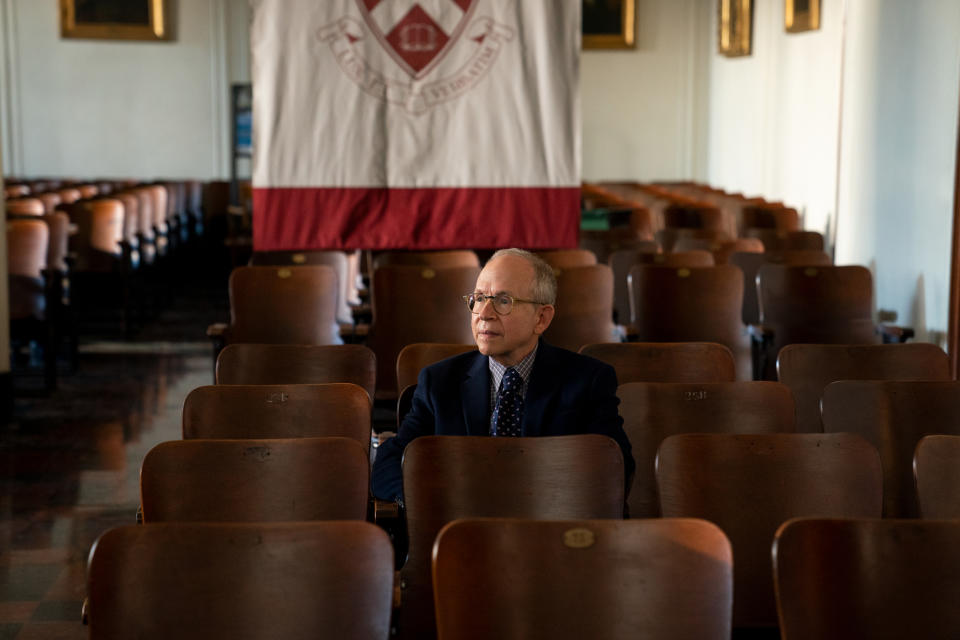Many Asian Americans are running from 'model minority' characters. Not Sandra Oh.
As many Asian Americans have pushed back against model minority tropes in recent years — sometimes even opting to celebrate “bad Asians” who’ve chosen nontraditional paths — actor Sandra Oh took on a lead role as an Asian American academic.
On the surface, Oh — who portrays Ji-Yoon Kim, the head of the English department at the Ivy League-esque Pembroke University, in the Netflix show “The Chair” — inhabits a character who somewhat falls into the studious Asian stereotype. But that doesn’t bother her.
We “shouldn't be afraid of seeing ourselves,” Oh said, speaking to NBC Asian America from a characteristically cloudy London.

The show, released Friday, revolves around Ji-Yoon’s journey as the first female chair of the university’s English department. The historic distinction, however, comes with its own drama as Ji-Yoon’s power thrusts her into a steady stream of issues that reveal generational divides and racial tensions against the backdrop of an age-old institution that’s seen little evolution in its years.
Oh — who’s best known for portraying a medical doctor, Cristina Yang, on “Grey’s Anatomy,” as well as the highly skilled, steely MI5 operative Eve Polastri in “Killing Eve” — often tows that line with characters who on the surface might seem to uphold those unfeeling, severe, overachieving Asian Hollywood tropes. Yet Oh has managed to make her characters more human, developing a loyal fandom within and beyond the Asian American community.
Building a character that avoids defaulting to anything reductive is “very simple,” she said. Regardless of who the character is, there needs to be sufficient dimension shown on screen. Oh explained that what “Asian Americans have felt has been missing is a fullness of character and a fullness of self.”
“I don't care if the character is ... an ambitious doctor, or a lawyer, or someone who's a chef, or these things that make us nervous that it's a trope,” Oh said. “You just want it to be specific and true. Because that's what will resonate.”
She added, laughing: “Come on! Don't tell us that we're not ambitious doctors, because we absolutely are!”
Even after a decadeslong push from Asian Americans for better representation, research shows Hollywood continues to fall short. In a study released this year, researchers assessed 79 primary and secondary Asian American and Pacific Islander characters across the top films of 2019. While evaluating them from "invisible" to "fully human" — defined as having a full spectrum of relationships — researchers found that most characters fell into the categories of "silenced, stereotyped, tokenized, isolated, and sidekicks/villains." When examining the 200 top-grossing films of 2018 and 2019, they found almost 75 percent of tertiary or minor AAPI characters spoke five lines or less of dialogue.
Oh, on the other hand, explained she’s had the privilege of portraying characters who either have had long arcs or their many complexities revealed to the audience. Dr. Christina Yang, for example, was a character who unfolded, grew and evolved over the course of a decade, Oh said, calling her experience playing the “Grey’s” character “a great gift.”
Similarly, while Eve Polastri, who had been a by-the-book paper-pusher, may have once possessed qualities that could be considered aspects of a sort of “everywoman,” Oh said, her “journey in self-discovery” unfurled through her dangerous sort of pas de deux with assassin Villanelle. Eve, who’s pegged as rather steely in the beginning of the series, sees her vulnerabilities surface as the show progresses.
Giving these characters the depth they deserve also requires certain threads of reality to be sewn into their fictional lives, Oh said. In “The Chair,” this is particularly well reflected in the sticky, complex power and racial dynamics in that academic setting. Ji-Yoon, an Asian American authority figure of sorts, navigates a spectrum of complicated relationships.
There are, for example, the honest, uncomfortable truths between her and the young, popular Black professor played by Nana Mensah, Yasmin "Yaz" McKay, who is seeking tenure at an institution with a predominantly white, male faculty.
“I really liked the conversations that professor Kim and professor McKay, who is a Black female professor, have because you actually have two people of color, who are different colors, who are trying to do the same thing in some ways but who have slightly generational different approaches to it,” Oh said.

In that dynamic, Oh continued, McKay expresses this idea that Kim “is either playing nice or trying to please everyone.”
“It's treading a very, very fine line of what I feel, how we are interpreted,” Oh said of Asian Americans in many real-world dynamics.
In another layered relationship, Ji-Yoon attempts to, at first, delicately deal with Bob Balaban's character Elliot Rentz, an aging, esteemed white male professor who contends with his waning popularity with students while still wielding his power as chair of McKay’s tenure case.
"You see her deal with professor Rentz, when she is in cajoling, trying to relate with him as a member of the ‘family,’ and eventually getting angry with him because he needs to step up and basically push through Yaz’s tenure," Oh said.
With such profoundly human characters in her repertoire, along with a career that’s been dotted with accolades and history-making moments, Oh has indeed taken away some salient insights. However, when it comes to race in the industry, she’s ready to admit Hollywood isn’t always transparent or explicit.

In the past, she’s opened up about how, when her agent had called about booking a role on “Killing Eve,” Oh had instinctively assumed she had not been considered for a lead. The actor said she remembers the moment as being "profoundly destabilizing."
“When I decided to talk about it, I was still trying to figure it out ... what you are really confronting with your own internalized racism.” she said.
It was a lesson, Oh explained, in proactively interrogating the status quo.
“You should always be curious, you should always be questioning, and I'm constantly trying to figure out why my characters are doing what they're doing,” Oh said. “There's a lot of self-reflection in that.”

